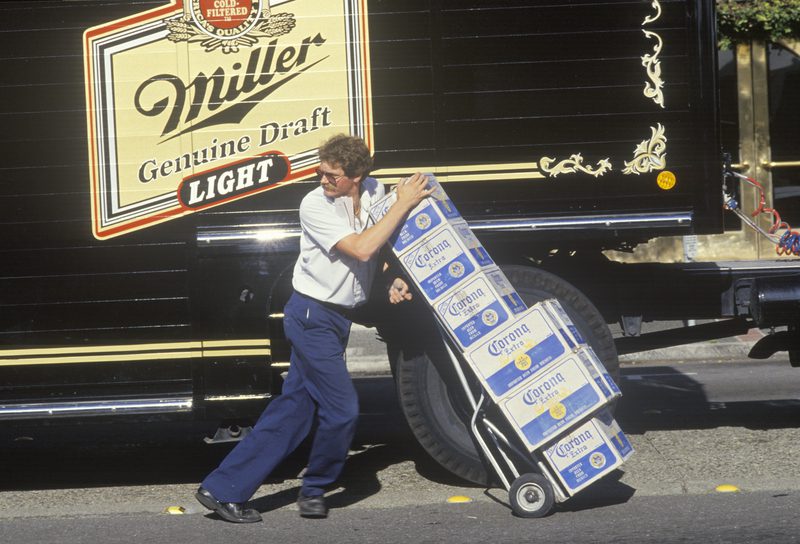TRENTON, NJ – You no longer have to leave your house in New Jersey to buy beer and alcohol. Today, the state attorney general’s office gave the greenlight for home delivery services such as DoorDash to deliver booze to your front door.
It is still illegal for supermarkets, convenience stores and gas stations to sell alcohol and liquor in New Jersey.
“Opening a new frontier for growth in New Jersey’s alcoholic beverage industry, Acting Attorney General Matthew J. Platkin announced that the Division of Alcoholic Beverage Control (ABC) issued a special ruling today that allows third-party delivery services like DoorDash, Instacart, and Amazon Flex to deliver alcoholic beverages – including cocktails “to go” – from restaurants, bars, and liquor stores to customers’ doorsteps,” the state said on Friday.
The “Third-Party Delivery Permit” – authorized by ABC Special Ruling 2022-– ushers in a new era of modern technology and e-commerce in New Jersey’s alcoholic beverage industry that benefits businesses and customers, while maintaining safety and preserving the legislative intent of the 89-year-old Alcoholic Beverage Control Act that established the state’s alcohol distribution system.
The permit allows delivery services to enter formal agreements with restaurants, bars, and liquor stores to make deliveries on their behalf.
“Opening the door to allow for third-party services to deliver alcoholic beverages to New Jersey residents will allow our local businesses to adapt to the everchanging world of technology and e-commerce,” said Governor Murphy. “Safety is a key element of this ruling; we want to make sure that those involved in delivering and receiving these products are authorized to do so. As we continue with the COVID-19 economic recovery, we must continue to take steps to evolve and adapt to our new normal.”
“The demand for delivery services exploded during the COVID-19 pandemic and the Third-Party Delivery Permit expands that market in New Jersey and allows retail licensees to tap into it,” said Acting Attorney General Platkin. “This new permit strikes a balance that has been the hallmark of the Murphy Administration to continue innovation and growth in business but without sacrificing or jeopardizing public safety. This is also a boon for consumers who have grown accustomed to using smart phone delivery apps to order everything from groceries to gourmet meals.”
According to the state, ABC regulations permit only licensed retailers and transporters to deliver alcoholic beverages in New Jersey. The Third-Party Delivery Permit, which carries an annual cost of $2,000, updates those historic procedures by authorizing a third-party delivery model—that is, allowing independent contractors using their personal vehicles (without transit insignia) to deliver alcoholic beverages to customers’ residences on behalf of New Jersey retail licensees, and charge a fixed fee for their delivery services.
“This is a game changer for New Jersey’s alcoholic beverage industry and a tremendous opportunity for growth,” said ABC Director James B. Graziano. “We’ve worked diligently to craft a permit that serves as an economic stimulus for the industry while maintaining the integrity of New Jersey’s robust liquor laws. The Third-Party Delivery Permit includes appropriate safeguards to ensure orderly, controlled, verifiable, and accountable deliveries of alcoholic beverages.”
Platkin’s office said the following in a statement on Friday:
But safety is key – in order to qualify for a Third-Party Delivery Permit, an applicant must submit a method of operation as part of the application process that describes in detail operating protocols, including procedures for:
- conducting initial and recurring background checks of delivery workers, including criminal history and driving record;
- providing alcohol-compliance training and certification to delivery workers who are eligible to deliver alcoholic beverages;
- verifying that receiving customers are of legal age and not visibly intoxicated; and
- refusing delivery and returning alcoholic beverages to retail licensee when necessary, such as when a customer is underage or intoxicated, refuses to sign for the delivery, or there is there is reason to suspect the customer is accepting delivery on behalf of an underage person.
Additionally, an applicant must submit a sample formal agreement with a retail licensee as well as a sample formal agreement with a delivery worker. A Third-Party Delivery Permittee will be required to have formal agreements with retail licensees and delivery workers before any deliveries are made.
Only restaurants, bars, and liquor stores – which operate under retail licenses that have statutory privileges to sell and deliver alcoholic beverages for off-premise consumption – have the option of using the services of a Third-Party Permittee. Currently, businesses operating under manufacturing licenses – such as craft breweries and distilleries – do not have statutory delivery privileges and therefore cannot use the services of a Third Party Delivery Permittee.
Under the Special Ruling, a Third-Party Delivery Permittee will be responsible for ensuring that its delivery workers comply with its approved method of operation and the permit’s conditions and restrictions, including the following prohibitions:
- leaving alcoholic beverages unattended or storing alcoholic beverages overnight;
- subcontracting a delivery of alcoholic beverages;
- delivering alcoholic beverages to customers who are actually or apparently intoxicated or under the legal age to purchase or consume alcohol; and
- delivering alcoholic beverages to the campus of any college or university.
The post Acting AG Platkin: ABC Issues Special Ruling to Allow Third-Party Delivery Services to Deliver Package Goods and Cocktails to NJ Customers’ Doorsteps appeared first on New Jersey Office of Attorney General.
